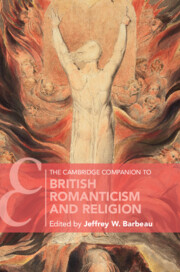Book contents
- The Cambridge Companion to British Romanticism and Religion
- The Cambridge Companion to British Romanticism and Religion
- Copyright page
- Contents
- Illustrations
- Contributors
- Acknowledgments
- Chapter 1 Introduction
- Part I Historical Developments
- Chapter 2 Christianity
- Chapter 3 Christianity
- Chapter 4 Christianity
- Chapter 5 Judaism
- Chapter 6 Islam
- Chapter 7 Hinduism
- Chapter 8 Atheism
- Part II Literary Forms
- Part III Disciplinary Connections
- Index
- Cambridge Companions To …
- References
Chapter 3 - Christianity
Protestant Dissent
from Part I - Historical Developments
Published online by Cambridge University Press: 01 October 2021
- The Cambridge Companion to British Romanticism and Religion
- The Cambridge Companion to British Romanticism and Religion
- Copyright page
- Contents
- Illustrations
- Contributors
- Acknowledgments
- Chapter 1 Introduction
- Part I Historical Developments
- Chapter 2 Christianity
- Chapter 3 Christianity
- Chapter 4 Christianity
- Chapter 5 Judaism
- Chapter 6 Islam
- Chapter 7 Hinduism
- Chapter 8 Atheism
- Part II Literary Forms
- Part III Disciplinary Connections
- Index
- Cambridge Companions To …
- References
Summary
Romanticism and Protestant Dissent are deeply intertwined; this essay reflects on the long history of their cross-connections. In recent decades there has been an upsurge of interest in the inspirational power of Dissenting allegiances to Romantic-era writers, and the rich literary culture of specific religious groups. Individual writers nurtured and encouraged by Dissent are being restored to prominence, and we are beginning to recover the importance of nonconformist discourse in shaping the literature and culture of the long eighteenth-century – such as the influence of Methodist life-writing and different forms of devotional practice. The essay outlines the diversity of nonconformist practice in the period, and argues for the diffuse and far-reaching impact of Protestant Dissent, through the familial and friendship circles of nonconformity, its educational institutions and publishing networks, and its influence on social and political debate. More broadly, it seeks to trace Dissenting affiliations and inspirations in the work of Romantic-era writers, exploring the case study of Anna Letitia Barbauld in detail.
- Type
- Chapter
- Information
- Publisher: Cambridge University PressPrint publication year: 2021

